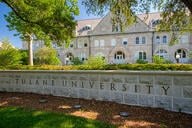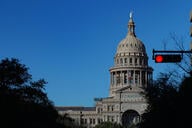You have /5 articles left.
Sign up for a free account or log in.
In debates over academic freedom, one point of contention has been the inclusion of controversial material that may not be directly related to the subject matter of a given course -- or at least that may not be related in a way that would be flagged on the syllabus. Faculty leaders at Pennsylvania State University -- one of the largest institutions in the country -- are moving to bolster the latitude of professors to engage in discussion of such material. The Faculty Senate last week adopted a policy (which now goes to the university president) that would remove unusually strict limits on such discussions.
The language proposed for removal states: "No faculty member may claim as a right the privilege of discussing in the classroom controversial topics outside his/her own field of study. The faculty member is normally bound not to take advantage of his/her position by introducing into the classroom provocative discussions of irrelevant subjects not within the field of his/her study." Further, the proposed changes would remove an obligation to present all information in a way consistent with a "judicial mind."
The Faculty Senate proposal keeps other provisions, however, that are designed to assure that a course on chemistry doesn't become one on contemporary politics. Faculty members would still be "responsible for the maintenance of appropriate standards of scholarship and teaching ability, and for not persistently intruding material which has no relation to their subjects."
And while the "judicial" phrase -- seen by some as limiting the ability to express opinions on one side or the other of a debate -- would be removed, other requirements remain. Faculty members are encouraged to educate students "to form their own opinions," and to "present information fairly."
The revisions make other changes as well, noting explicitly the need for academic freedom in discussion of governance issues, for online instruction and for librarians.
But in terms of policy changes, the shifts on classroom conduct may be the most significant. While faculty members debated precise language in the policy at length, there were no substantive disagreements on making the changes.
Those who track academic freedom nationally said that the changes were overdue. Cary Nelson, national president of the American Association of University Professors, said via e-mail that "Penn State had one of the most restrictive and troubling policies limiting intellectual freedom in the classroom that I know of. It undermined the normal human capacity to make comparisons and contrasts between different fields and between different cultures and historical periods. The revised policy is a vast improvement."
The blog College Freedom called some of the provisions proposed for removal "absolutely appalling attacks on academic freedom," and said that the new language was "dramatically improved."
In 2006, Pennsylvania's public colleges and universities were the subject of intense scrutiny from David Horowitz and other critics of academe over class content, among other subjects. (The current version of the policy was last revised in 1994, well before the scrutiny.) But these changes at Penn State have been discussed with little fanfare or controversy. The student newspaper relegated the issue to two paragraphs in an article about the Faculty Senate meeting -- focusing instead on the Senate's discussion of alcohol issues at the campus.
Jean Landa Pytel, chair of the Faculty Senate and associate professor of engineering science and mechanics, said that there was no incident or debate that led to the idea of changing the policy -- only a sense that "professors need to be given sufficient flexibility to do a good job in the classroom." Further, she said that the proposed changes reflect that "we're teaching critical thinking" and that sharing faculty perspectives can advance that goal.
Pytel stressed that she didn't see the changes as leading to faculty members suddenly opining about politics every day (at least in classes about issues other than politics). "I don't know of anyone wanting to use the classroom as a platform like that," she said. And Pytel stressed that someone who did might be violating the policy as the faculty members want to amend it. "We have a lot of students here. If anyone engaged in that behavior, we would hear about it."



